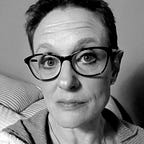Don’t Call Me That!
My difficulty with labels — in permanent ink, at least
I have a problem.
Okay, yes, I have many problems, and have had quite a few therapists who didn’t know what to do with me, but that may have been because I didn’t know what to do with myself and where to start in explaining myself to them. I digress.
It was brought to my attention in a gentle manner that perhaps I am averse to being labeled in any way. I don’t like being placed in a mental illness bucket. I don’t know what you’d call my sexuality type. I don’t even fit into my gender norm; but I don’t like the term gender nonconforming, either, because that implies that there should be something we strive to conform to.
Why don’t I like being labeled?
It may be related to the fact that I’m naturally a peacekeeper, or a people pleaser. I don’t like conflict. If I put my foot down somewhere, someone won’t agree with me, and I’ll have to stand my ground. I’ll have to argue my point or have the discomfort in disagreeing with them — even if they are judging me about something that is inherently about the core of my being, which I should know the best answer to anyhow and should have the confidence to stand up and know this! You can’t please everyone — which I do realize — but that doesn’t stop me from trying. And being scared of any sort of friction, even if it’s silly or uncalled for or inconsequential, stops me from speaking up sometimes. I like peace, and can take the coward’s way out in order to maintain it.
My distaste towards labeling could also stem from the fact that it’s just so permanent, whether you intend for it to be or not, and even if you change, and your category changes — or your point of view changes — sometimes you’re stuck in the original bucket someone put you in, like it or not. Even if it doesn’t fit you now. For example, someone who is misdiagnosed with a mental illness may discover that another illness or an alternate explanation better describes her circumstances. Perhaps there was part of her history that wasn’t taken into account, or a part of the illness hadn’t developed yet, or maturity changed one aspect. She might be stuck with that original diagnosis following her around in her medical history — even if it wasn’t accurate or doesn’t explain things now. It’s like having permanent ink on the wall that keeps showing through every time you try to repaint it. Once you get placed in a bucket — sometimes there’s just no going back.
The other explanation to my dislike towards being categorized is that I’m a perfectionist, and unless I perfectly fit into that round hole, unless each part on the checklist of the definition can be answered as a “yes” — don’t put me in there. Since there is no such thing as perfection, and no person is like another, and there is no textbook example where a person could exactly fit into a category — the perfectionist just can’t win. Those categorical “buckets” are really guidelines, I realize, not hard and fast rules — and we’re supposed to use a little elasticity when reading the guidebook for where a person fits into anything when it comes to labeling. But get it through my all-or-nothing, “everything-has-to-be-just-right” brain, and that’s where I throw the guidebook AND the buckets out the window and say nothing should be categorized and everything is a grey area.
I do realize labeling and categories can be helpful. In the real world, we aren’t all treated equally, so we have to have categories to protect those who are discriminated against — it sounds backwards, but otherwise how would we know who to protect? Until we all treat everyone equally — another perfectionist’s goal — we need those labels. Those of us who are stigmatized need to label ourselves and stand up for those of us in that category to show we aren’t all “bad”, as those who judge us may think. And treatments are based on categories of illnesses — whether it’s medicine, type of talk therapy, or alternate approaches. So, yes, we need those buckets, even though I resist being placed in them from time to time.
And for the record? There ARE labels I’ve claimed in my life that I’ve accepted as a part of me. Some of them: woman, daughter, mother, sister, employee, college graduate, University of Nebraska alum, Lincoln High School (Nebraska) alum, synesthete, pre-diabetic, manic depressive, post-traumatic, sensory sensitive, divorcee, brain trauma victim, alcoholic, agronomist, home owner, mentally ill, Star Wars fan, animal/insect/critter enthusiast, cat lover, accidental gardener, friend, deist, nature lover, book reader, writer, artist, blogger, poet…
and most important?
Human.
November 25, 2020
Tansy Julie Soaring Eagle Paschold
